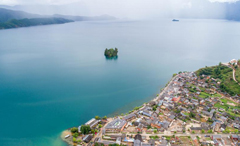Cleanup of water violations 92% done
2018-11-26
China Daily
Almost 92 percent of the environmental violations uncovered this year during inspections of the lakes and waterways that supply China’s drinking water have been addressed, the Ministry of Ecology and Environment said in a news release over the weekend.
However, the problems that remain unsolved will be “hard nuts to crack,” it added.
Officials discovered 6,251 violations during two rounds of inspections involving 1,586 bodies of water in May and September. The targeted locations provide drinking water supplies to cities in the Yangtze River Economic Belt and many more around China.
As of Nov 21, 5,745 violations had been corrected, the ministry said on Nov 24.
Early this month, the Ningxia Hui autonomous region was found to have made no progress in fixing its two violations, but over the weekend it was listed among six provincial regions that have been given a 100 percent pass. Also on that list were Shanghai and the Inner Mongolia autonomous region.
Sixteen regions, including Shandong and Sichuan provinces and Beijing, have addressed 90 percent of their problems, while Tianjin ranked last at 77.8 percent, the ministry said.
The State Council published an action plan in March that focused on environmental protection in areas around drinking water sources. It vowed to root out violations found by inspectors by the end of this year.
But accomplishing that task could be “highly difficult,” according to the ministry release, which said six provincial regions had failed to make progress as scheduled, including Guangdong and Jiangxi provinces and Tianjin.
More than half the violations found in Guangdong, Jiangsu and Yunnan provinces have yet to be corrected, it said, adding that Guangdong, the country’s most economically developed province, has 144 violations outstanding.
A high-level inspection team has also criticized Siping, in Jilin province, for its slow progress in dealing with illegal tourism activities near a reservoir that supplies drinking water to 600,000 urban residents.
During a visit late last year, the team, headed by a ministerial-level official, found a developer had felled 37,000 trees, seriously damaging the ecological environment.
Local authorities failed to stop the illegal operation until July, and more than 200,000 tourists had visited the key protected area surrounding the reservoir this year, according to the team, which vowed to further investigate and hold those responsible to account.


